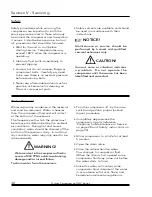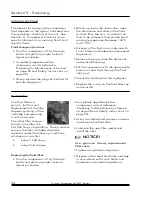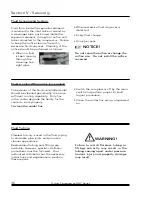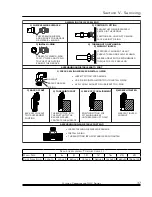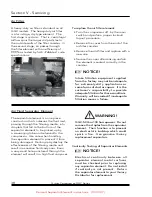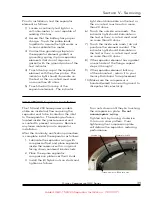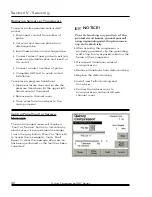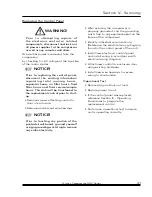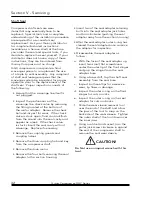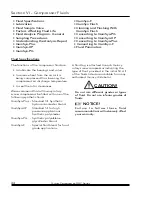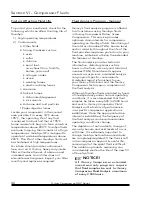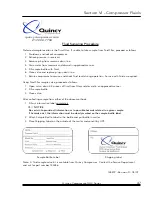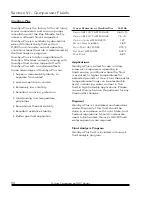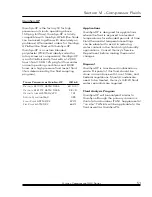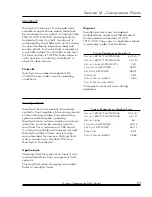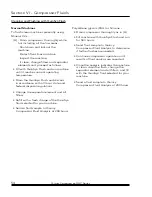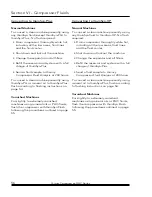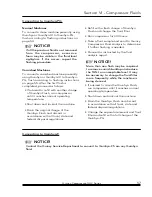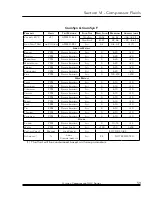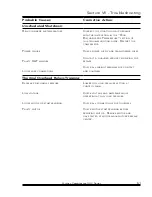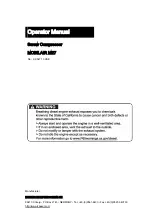
Section VI - Compressor Fluids
Factors Affecting Fluid Life
To protect your investment, check for the
following, which can affect the long life of
QuinSyn:
) High operating temperatures
2) Contaminants:
a. Other fluids
b. Strong Oxidizers such as:
• acids
• sulfur
• chlorine
• burnt fuel -
i.e. exhaust from: forklifts,
boilers, jet aircraft
• nitrogen oxides
• ozone
• welding fumes
• plastic molding fumes
c. Ammonia
d. Solvent fumes:
• chlorinated degreasers
• ink solvents
e. Airborne dust and particles
f. Paper digester fumes
Locate your compressor in the coolest
area possible. For every 8°F above
95°F, the operating life of any fluid
is reduced to about half that at 95°F.
Some mineral oils begin to form varnish at
temperatures above 200°F. QuinSyn fluids
are more forgiving than mineral oil at high
temperatures. QuinSyn-XP is designed to
operate at sustained temperatures above
200°F. The life of other QuinSyn fluids will
be shortened at high temperatures.
Air intake should provide contaminant-
free, cool air. A Quincy heavy-duty intake
filter will reduce the risk of abrasion and
increased wear. An air filter does not
eliminate reactive gases. Inspect your filter
monthly and replace as required.
Fluid Analysis Program - General
Quincy’s fluid analysis program is offered
to all customers using QuinSyn fluids
in Quincy Compressor Rotary Screw
Compressors. This service provides
optimum drain intervals for compressors
operating on QuinSyn fluids. Monitoring of
the total acid number (TAN), barium level
and/or viscosity throughout the life of the
fluid provides maximum protection to your
machine, while best utilizing the extended
life features of QuinSyn.
The fluid analysis provides historical
information, detailing items such as
hours on the fluid, viscosity and total acid
number (TAN). Should results appear
unusual or suspicious, a detailed analysis
can pinpoint specific contaminants.
A detailed report is furnished to you,
your Quincy Distributor and the Quincy
Compressor factory upon completion of
the fluid analysis.
Although QuinSyn fluids are rated by hours
of life expectancy under normal operating
conditions, it is recommended that fluid
samples be taken every 500 to 2000 hours
and sent to Quincy Compressor Fluid
Analysis until a history of performance
in a specific compressor application is
established. Once the appropriate drain
interval is established, the frequency of
the fluid analysis can be reduced unless
operating conditions change.
The depletion of antioxidants, change of
viscosity, barium and acid levels all occur
with time. It is extremely important to
change QuinSyn before the antioxidants
are completely depleted. If the fluid is left
in the compressor beyond its useful life,
removing all of the spent fluid is difficult.
The oxidation products remaining can
considerably shorten the life of the new fill
of QuinSyn fluid.
notiCe!
All Quincy Compressor extended
airend warranty programs require
that fluid samples be sent to Quincy
Compressor Fluid Analysis a minimum
of every 2,000 hours.
46
Quincy Compressor-QGV Series
Summary of Contents for QGV-100
Page 2: ......
Page 6: ......
Page 17: ...Section II Description This page intentionally left blank Quincy Compressor QGV Series 11 ...
Page 74: ...Appendix A Dimensional Drawings QGV 50 air cooled 68 Quincy Compressor QGV Series ...
Page 75: ...Appendix A Dimensional Drawings QGV 50 water cooled Quincy Compressor QGV Series 69 ...
Page 76: ...Appendix A Dimensional Drawings QGV 75 100 air cooled 70 Quincy Compressor QGV Series ...
Page 77: ...Appendix A Dimensional Drawings QGV 75 100 water cooled Quincy Compressor QGV Series 71 ...
Page 78: ...Appendix A Dimensional Drawings QGV 150 200 air cooled 72 Quincy Compressor QGV Series ...
Page 79: ...Appendix A Dimensional Drawings QGV 150 200 water cooled Quincy Compressor QGV Series 73 ...
Page 89: ......

